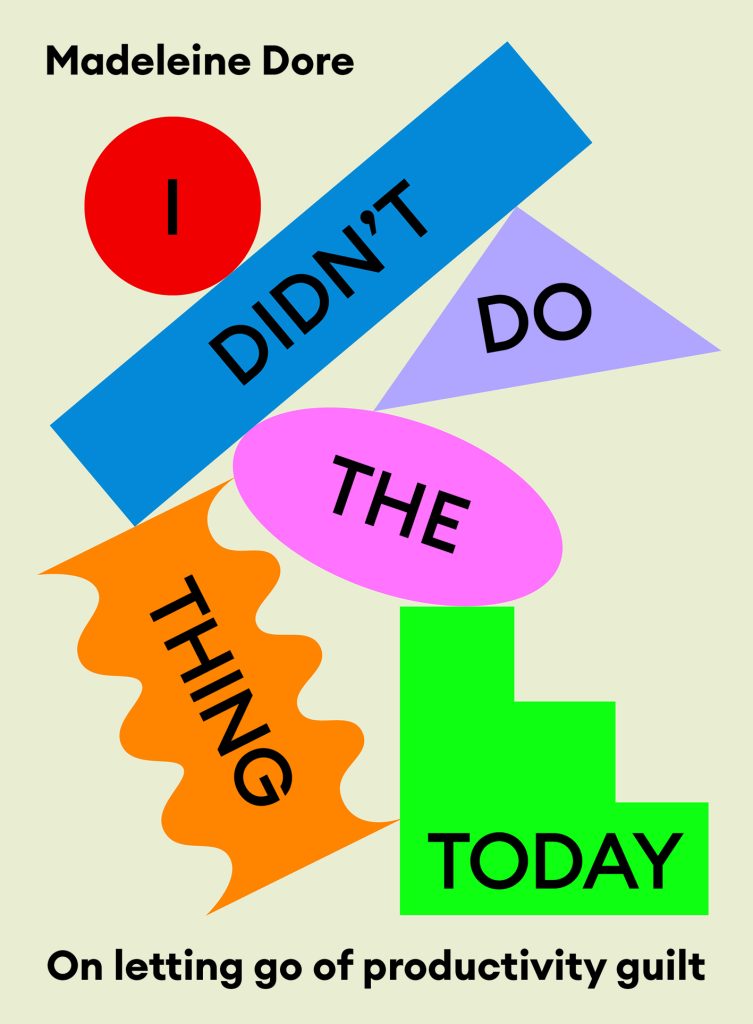Busy, mama? You’re not alone. If you feel like you’re falling into the trap of busyness, this one’s for you. In this extract from her book ‘I Didn’t Do the Thing Today’, Madeleine Dore tells us why being busy is the prelude to burnout.
By Madeline Dore
Let’s talk about the trap of busyness.
Because if we spent a day collecting the answers we hear to the question ‘How are you?’, we wouldn’t be wrong in thinking ‘busy’ has become synonymous with ‘good’.
We both project and presume busyness with the phrases ‘I’m so busy’, or ‘I know you’re so busy’. Instead of sharing what’s novel, what we might need, or what’s concerning us, we can use ‘busy’ as a stand-in for what’s really going on in our daily and inner lives.
“We’ve internalised the idea that to be content, we must always be doing something—we need to be busy in order to be productive, successful or worthy.”
When the response to how we are isn’t ‘busy’, often it’s a close relative: ‘I feel like I’m not doing enough.’ When we perceive we don’t measure up to our own expectations of busy, we experience productivity guilt.
Everyone else appears to be busy, we think, and here I am in the midst of my day, not quite busy enough, but not quite able to step into the room of rest while the pressure to be busy follows me around.
At times, busyness is unavoidable.
Everything might come at once, or there’s more and more added to our plate. Busyness may stem from making ends meet. We might have multiple and even conflicting responsibilities, pressing demands or unexpected events bogarting our days, making it difficult to untangle from being busy and still keep afloat in life.
Other times, busyness can be tied to coping with the day—during challenging times, some people take on more simply as a way of keeping moving.
Busyness can be a buffer, just as retreating can be, allowing us to grieve or face something on our timeline.
Embracing Busyness
Sometimes, we embrace busyness. We enjoy the sense of momentum it brings to our days. The adage ‘If you want something done, ask a busy person’ speaks to this.
Work, multiple creative projects and a full social calendar can give shape to a day. Or perhaps it’s simply our natural frequency to be busy, and to dampen it would mean dampening ourselves.
But there is a distinct difference between the busy that is unavoidable, a comforting buffer or for our own momentum, and the needless busying that can perpetuate productivity guilt.
That is, the busyness we wear as a badge of honour. For many in privileged circumstances, this busyness for its own sake is a choice, yet we rush around as if we have no say in the matter.
We’re just so busy—but to what end?
So why are we so busy?
As Ralph Waldo Emerson wrote in his journals, ‘It is not enough to be busy; so are the ants.
The question is: What are we busy about?’ What are we so busy doing? Things we could delegate, things we could skip, things we could decline—things we do just for the sake of doing things?
We rarely pause to think of how our days could be different without all the needless busying. It can sometimes be difficult to distinguish which variety of busyness we are entangled in.
Perhaps the clue is that we feel we are in a tangle of our own making. Such self-imposed busyness often stems from a place of relentless ambition, comparison to others or expectation.
I should take on extra work so I can secure a promotion. And I should take up a hobby—everyone on the internet is sharing theirs. I should fill my planner a month in advance so I don’t have to face an empty day.
Perhaps we are afraid that we if don’t keep ourselves busy, the well will run dry. Sometimes we have a scarcity mindset—we say yes to every opportunity and invitation for fear it might be the last.
Perhaps we even strive to be less busy, but find we are more admired or respected when we are keeping up the busyness charade, so we stay on the hamster wheel to keep up appearances.
The pressure to be busy
Of course, this variety of busy is not entirely self-propelled—there is a pervasive societal pressure to have something to show for our time.
An overworked lifestyle has become a status symbol: we conflate being busy with being important because society has taught us to.
We’ve internalised the idea that to be content, we must always be doing something—we need to be busy in order to be productive, successful or worthy.
In turn, we’ve become over-reliant on being busy as it provides reassurance that our lives are moving, and therefore meaningful. But if we’re perpetually caught in a cycle of doing more, we can be too busy to enjoy life.
Needless busyness, in this way, is an affliction. The academic Omid Safi shared this observation in an essay for The On Being Project called ‘The Disease of Being Busy’: ‘This disease of being “busy” (and let’s call it what it is, the dis-ease of being busy, when we are never at ease) is spiritually destructive to our health and wellbeing. It saps our ability to be fully present with those we love the most in our families, and keeps us from forming the kind of community that we all so desperately crave.’
Filling our days with the dis-ease of doing upon doing doesn’t necessarily constitute time well spent—sometimes it’s just a distraction from another dis-ease: that of figuring out what we really want to be doing with our days.
We crowd our schedules with so much that we don’t have time for the things that are most important to us. And we become afraid of blank space and we turn away from rest, even though at times that’s exactly what we need.
We find ourselves saying yes to extraneous work or activities, either as a knee-jerk reaction or because it’s a way to avoid doing the things that matter most to us.
Productivity pressure
This scarcity of free time can contribute to productivity pressure: we have so little discretionary time available that we feel we must not waste it.
Fulfilling but non-essential activities start to feel like a waste of time—reading, going for a walk, pottering in the garden, snuggling on the couch with a lover. Perhaps it’s no coincidence that these are the very things that don’t cost a thing. The best things in life might be free, but we don’t have the time for them.
When the equation is flipped—we earn less and have more time—the guilt can soften. We might not question spending an afternoon wandering around because we have the time.
But few of us can simply decide to earn less in order to work less. It can be difficult to unwind from the trappings of a busy world—especially if we’re contending with financial precarity, or have dependants, or are focusing on a long-term goal.
Some may not wish to—again, busyness can be what provides some people with momentum and even contentment. But for those of us who lament being busy and could find ways to be less so, why don’t we?
What prevents those of us who can afford to be less busy from finding something extraneous to dial down in our days?
Too busy to connect
Perhaps we can’t all dial down our busy, but we can come up with new answers to the question ‘How are you?’—because when our knee-jerk response is ‘busy’, it can be a barrier to connection.
When I spoke to the Australian social researcher Hugh Mackay, he said that busyness is a way to insulate ourselves from one another. ‘It can be a way of not having to exercise compassion because we are distancing ourselves from the people that we could show compassion towards, where busyness is kind of the ultimate form of self-absorption in a way.’
Surely we don’t want to be so busy that we don’t have the time to connect with people. And surely we don’t wish to be so busy that we don’t enjoy our lives.
Surely we don’t really think busy is good—we just needed the permission from each other to be something else.
After all, busy is not the same as productive, and productive is not the same as worthwhile.

Text from I Didn’t Do The Thing Today by Madeleine Dore. Murdoch Books RRP $32.99










